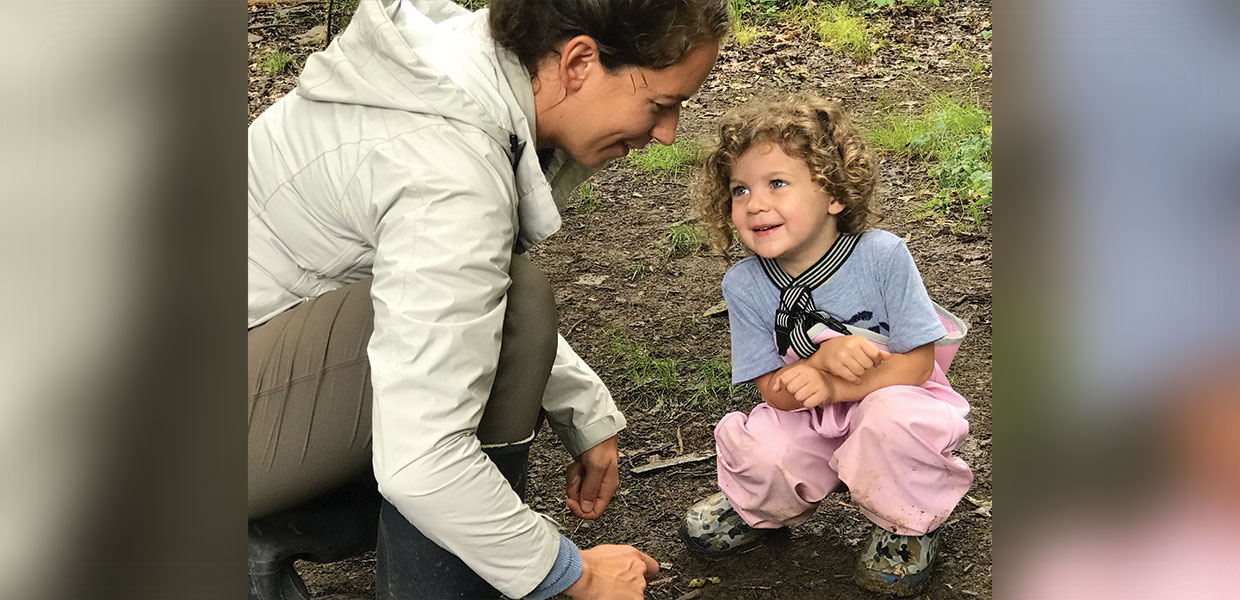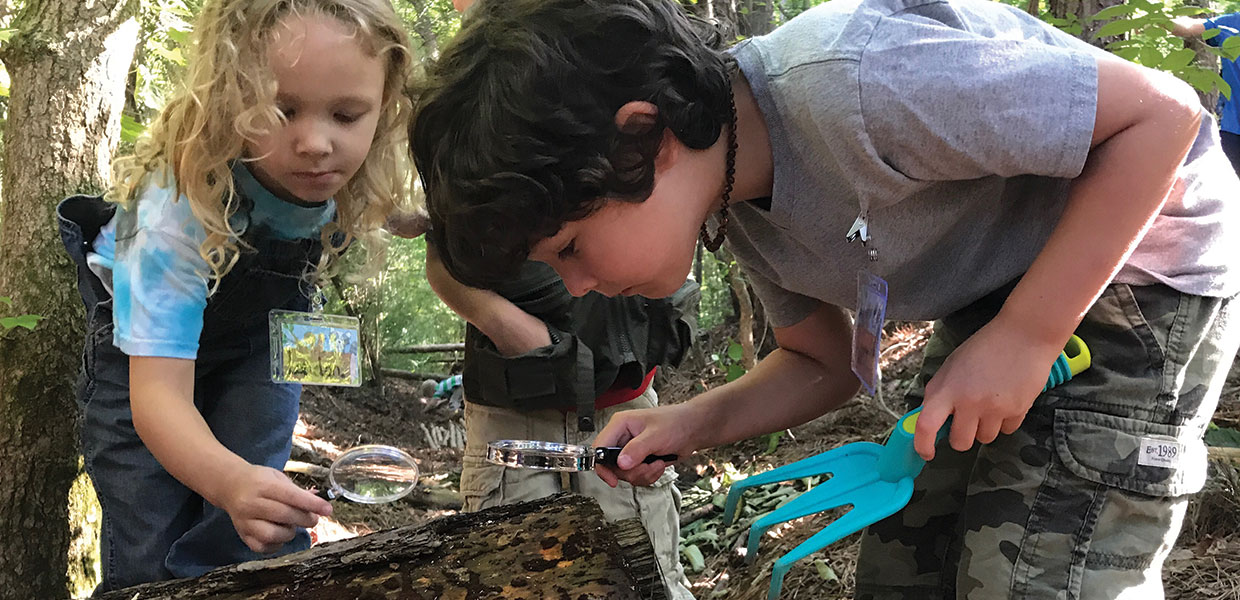
Karen Sullivan Williams

Karen Sullivan Williams
Imagine 10 teachers and a professor wading into a tangled forest thicket armed with loppers and bug spray, laughing and calling to one another while they work to make something beautiful out of a neglected corner of a school playground.
The time was mid-June, the location was Lester Coon Adventist School in Apison, Tennessee. The objective was to prepare for and facilitate a week-long Forest Kindergarten Camp for local children.
Teachers representing four states from three different conferences convened to participate in two graduate-level courses in Forest Kindergarten, offered by Southern Adventist University in Collegedale, Tennessee, under the guidance of Jean Lomino.
For the first part of their training, teachers gathered at Lomino’s established Forest Kindergarten, at Wauhatchie School in Chattanooga, Tennessee. They spent mornings observing a Forest Kindergarten in action, and then the afternoons debriefing and discussing outdoor education as applied to early childhood.
In the following days, they met at Lester Coon Adventist (LCA) School where teachers planned and then facilitated their own week of Forest Kindergarten. Coursework culminated in a presentation to the local school board.
The LCA School board was impressed. Steps were taken to begin a nature-based primary classroom at Lester Coon, where the early childhood classroom spans kindergarten through second grade. The schedule and instructional design would be arranged to meet academic needs of all three grade levels, with two hours of outdoor play incorporated into the school day. Though it would be Forest School rather than strictly Forest Kindergarten, goals and main components of the outdoor program would remain the same. Church members were told, enthusiasm was high, and word got out.
Late this past summer, LCA School was at capacity for the upcoming school year, with full classrooms and a waiting list. This was a welcome change, the result of many small steps on a larger journey.
The Church needs to see outdoor education in action. Abundant research confirms what Ellen White admonished more than a century ago. Outdoor play prepares children for life, physically, mentally, socially, and spiritually. It promotes brain structure, and improves executive function and concentration, both of which are vital for school success.1 Nature-based play gives children opportunities to challenge their own limits and learn to assess risk,2as well as opportunities to practice problem-solving and creativity.3 Since the publication of Richard Louv’s bestselling Last Child in the Woods, parents, educators, and concerned citizens are beginning to realize the disconnectedness of society from nature, especially in children. Across North America interest grows as the media gives attention to Forest Kindergartens and other innovative outdoor programs. The world is catching on to nature education. What better way to bolster Adventist schools, than to go back to the roots and reclaim this part of the mission?
For LCA School, the opportunity to host a group of teachers in training for Forest Kindergarten fit perfectly with the direction the school was already headed. Teachers at Lester Coon had already taken steps to include outdoor education as part of their focus.
An old trail through the woods was reopened last year, and all three classrooms take to the path at different points in the morning. Walking provides a break from classwork and an avenue to see nature up close daily, strengthening observational skills, and promoting critical thinking. Often on these excursions students ask questions and seek answers: “Do roots have bark? What evidence can we find of creatures alive and well in a winter landscape? Where does the morning sun appear, and what direction is the trail taking us now?” Frequent, regular experience in a specific natural area is one of the hallmarks of outdoor education, and a short daily nature walk with time to ponder and observe gives bountiful rewards.
Other outdoor elements included a school garden, fort-building in the woods, nature journals, and guided experience outdoors replacing lessons from textbooks whenever possible. These gradual additions to the school menu can grow in frequency, purpose, and scope over time.
All three teachers at LCA School have taken at least a handful of outdoor education courses at Southern Adventist University. They have been in close contact with supervisors at the Georgia-Cumberland Conference as they implement new methods. There is conscious effort on the part of the school board to support teachers as they grow in knowledge, experience, and goal-setting for outdoor education.
This intentional direction was part of the reason LCA School was chosen as the host site for Southern Adventist University’s Forest Kindergarten coursework. The school’s location was also a factor, situated only three miles from Southern’s campus, and the school property had potential because of its several acres of forested land.
This year young students at LCA School enjoy daily forest playtime. Parents are happy, and Nancy Zima-Gentry, principal, can’t say enough about benefits of the program. “Outdoor education is valuable all through the grade levels,” she says. “Especially in the early years, nature-based education provides important building blocks for student development. Outdoor play is as essential as math and reading.”
Ellen White would have agreed. “During the first six or seven years of a young child’s life, special attention should be given to its physical training, rather than the intellect… Up to this period children should be left, like little lambs, to roam around the house and in the yards, in the buoyancy of their spirits, skipping and jumping, free from care and trouble…let the little ones play in the open air; let them listen to the songs of the birds and learn the love of God as expressed in His beautiful works. Teach them simple lessons from the book of nature and the things around them; and as their minds expand, lesson from books may be added and firmly fixed in the memory.”4
Lester Coon Adventist School is just one small school. Even at capacity, it can only contain so much joy and so much learning. Opportunities are wide open, and potential for outdoor education lies right outside the doors of many classrooms.
Go ahead and step outside. It’s a lovely journey.
References:
- G. Reynolds, “How exercise can boost young brains,” New York Times, October 10, 2014. http://well.blogs.nytimes.com/2014/10/08/how-exercise-can-boost-the-childs-brain/?_r=0).
- A. Stevenson, “Physical risk-taking: Dangerous or endangered?” Early Years, vol. 23 no. 1, pp. 35-43, March 2003.
- J. Hamilton, “Scientists say child’s play helps build a better brain,” NPR Ed., August 6, 2014. http://www.npr.org/sections/ed/2014/08/06/336361277/scientists-say-childs-play-helps-build-a-better-brain.
- E. G. White, Child Guidance (Hagerstown, MD: Review and Herald Publishing, 1982), pp. 300-301.
What You can Do:
- Watch a video description of outdoor education through the eyes of outdoor education professors Jean Lomino and Douglas Tilstra: http://video.wtcitv.org/video/3001618301/.
- Remember, this is a teacher-directed process. Best to let teachers choose their own journeys in outdoor education, while conferences, school boards, and administrators support and encourage. Forest School is not for everyone.
- Understand that outdoor education is not “all or nothing.” Start small. If you don’t have a forest, plant a garden. If all you have is a concrete play yard, plant a container garden. Bring nature into your classroom and substitute hands-on learning for book learning whenever you can. Some schools visit nearby natural areas regularly or attend outdoor programs offered by local organizations.
- Take a class or two. Southern Adventist University offers outdoor education courses every summer. They are lots of fun, and packed with practical ideas for providing outdoor, nature-based learning.
- Find a nature-based school in your region and ask to observe. The best way to understand Forest Kindergarten and other programs is to see them in action!
- Talk to your conference about providing training for teachers who desire it. (See Jean Lomino’s teacher training opportunities at www.wauhatchie.com.)
Georgia-Cumberland | October 2017



Comments are closed.